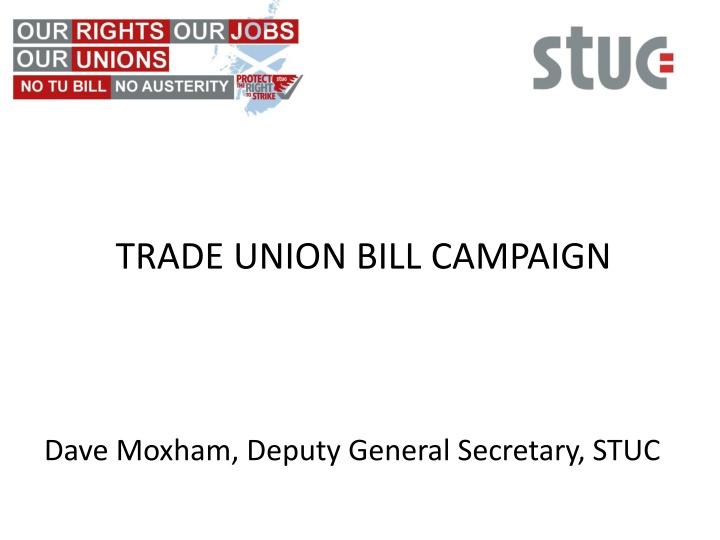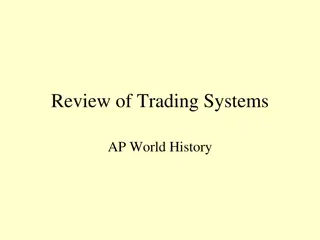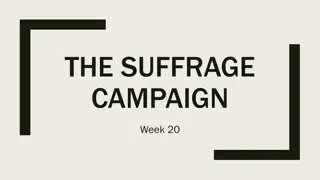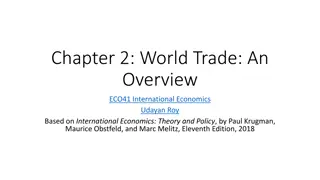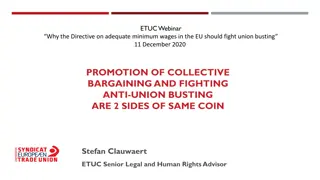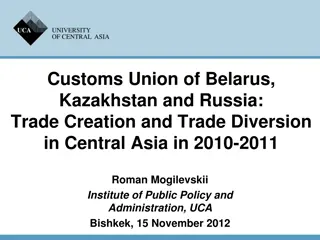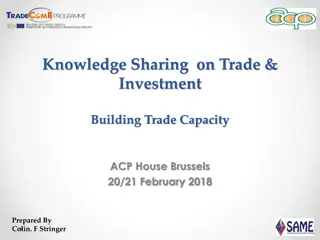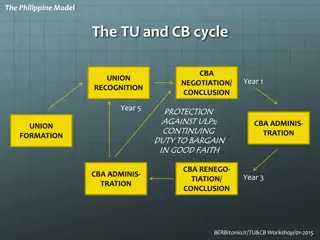Trade Union Bill Campaign Overview
The Trade Union Bill of 2015 aimed to reform trade unions and regulate strikes affecting public services. The bill faced various stages in Parliament, including readings, debates, and voting. Key aims included reducing union capacity, making industrial action harder, and imposing restrictions on strikes. The bill also outlined measures concerning union capacity, the right to strike, and reporting duties. Overall, the bill sparked controversy due to its impact on trade union activities and workers' rights.
Uploaded on Sep 13, 2024 | 1 Views
Download Presentation

Please find below an Image/Link to download the presentation.
The content on the website is provided AS IS for your information and personal use only. It may not be sold, licensed, or shared on other websites without obtaining consent from the author.If you encounter any issues during the download, it is possible that the publisher has removed the file from their server.
You are allowed to download the files provided on this website for personal or commercial use, subject to the condition that they are used lawfully. All files are the property of their respective owners.
The content on the website is provided AS IS for your information and personal use only. It may not be sold, licensed, or shared on other websites without obtaining consent from the author.
E N D
Presentation Transcript
TRADE UNION BILL CAMPAIGN Dave Moxham, Deputy General Secretary, STUC
TRADE UNION BILL 2015 The Government will introduce legislation to reform trade unions and to protect essential public services against strikes. Tory Party manifesto pledge for the 2015 General Election.
TRADE UNION BILL 2015 First reading (21stJuly) Formal introduction no debate on the Bill Second reading (Monday 14 September) MPs debated the main principles of the Bill. Commons decides whether the Bill should be given its second reading by voting, meaning it can proceed to the next stage. Committee stage (12th 27thOctober) detailed examination of the Bill; expert evidence; selection and consideration of amendments; consideration of clauses Report stage (No set time table but likely to be quickly after Committee stage) Full house considers report. MPs may speak to the Bill & propose amendments Third reading (Normally immediately after Report stage) Final chance for the Commons to debate the contents of a Bill. House votes on approval then passes to Lords. Lords process (after Commons Third reading) Similar process to Commons. Probable enactment of Bill (Spring 2016)
Key Aims of Bill Reduce union capacity and tie-up unions in bureaucracy Make it harder to take industrial action Make it easier for employers to break strikes & criminalise strikers Attack wider trade union campaigning and political funds
Union Capacity Public sector employers required to publish information on the cost of time off for union reps and publish details of use of i.e. Collective bargaining, representing members in grievances training programmes etc The government seeks wider powers to allow it to cap the time public sector employers allow union reps to spend representing members (without requiring primary legislation) Removes the option for public sector employers to utilise check-off New investigatory powers for the Certification Officer including power to access membership lists even if no-one has complained about a union s activities. Reporting Duty on union on whether industrial action has taken place in the last 12 months, the nature of the disputes, what action was taken, and the turnout and ballot results.
The Right to Strike Minimum 50 per cent turnout amongst trade union members who are entitled to vote 40% of trade union members who are entitled to vote must vote YES for action to go ahead
Strike breaking Extended notice period. From 7 days to 14 days Remove requirement to take action within a month but place a four month limit on action before seeking fresh mandate. The ballot paper must provide 'a reasonably detailed indication of the dispute with the employer. Where the voting paper asks whether members would support action short of a strike, the ballot paper must describe what form this might take, such as a work to rule. The expected timetable for the dispute must be set out on the ballot.
Strike breaking (contd) Removal of ban (since 1973) on use of agency workers to replace striking workers Existing picket rules moved into primary legislation Appointment of picket supervisor; identification of picketers; -Duty on unions to report protest plans publicly to employers and regulators 14 days in advance of any action with details such as timings, location, the number of participants Duty on unions to report on plans to use loudspeakers, props, banners Vetting of social media and website content New criminal offences and sanctions to be introduced such as an offence of intimidation on the picket line.
Political campaigning End of opt-out system for political funds Union members will also be required to opt-in every five years to agree to subscriptions being partly used to fund political parties or campaigns on political issues. This is not confined to political party funding. Duty to report on the use of all political expenditure above 2,000.
Public opinion - UK Challenge to convince public to support some of our positions on the Bill Support for Government s plans for unions Many believe it should be harder for unions to strike. But public opinion can be moved particularly women and younger people
Public opinion - UK Public support for the right to strike Strong opposition to use of agency workers to break strikes Public support thresholds but wary of comparisons with other election situations i.e. election turnouts Some opposition to big political messages i.e. we re being attacked because we oppose austerity this is just the Tories and their pals attacking working people
Public opinion - Scotland Scottish voters disagree that it should be harder for unions to call strikes Agency workers replacing strikers is also the most effective argument among Scottish voters for showing that the changes undermine the right to strike Most concerning thing about the changes is the impact on safety caused by employing agency workers to replace strikers. Scottish voters oppose the government s plans for unions
Public opinion - Scotland Arguments that focus on austerity, particularly that public sector workers need the right to strike to protect themselves from job cuts are effective among Scots, but not as effective as the agency workers argument. It is very likely that anti-tory messages work in Scotland It is highly possible that the Threshold argument may be seen differently in Scotland.
Scottish Political Context 85% support in General Election for parties opposed to Trade Union Bill Scottish Government clear statements opposing Bill & supporting facility time and check-off 58 out of 59 MPs will vote against the Bill Somewhat more sympathetic media STUC strongly embedded in Scottish civil society Working Together Review and Fair Work Convention Heightened level of general political awareness and activism? Stronger opposition to Tories Stronger opposition to austerity?
Our campaign Key message on rights; right to strike and opposing strike-breaking. Parliamentary strategy Convince devolved public bodies and Scottish Government to refuse to comply on facility time and check-off and pledge not to use strike breaking legislation. Lobbying and campaigning in Scotland Target the interference by UK Government in Scottish industrial relations where there is a better. Present a positive image of trade unionism in Scotland. Lobbying and campaigning in Scotland Reassert the importance of trade unions as campaigning organisations and oppose austerity. Lobbying and campaigning in Scotland
Campaign aims Defeat the Bill in Parliament or achieve significant amendment. Work with ALL Scottish MPs. Facilitate co-operation between SNP opposition and Labour opposition Support mitigation strategies. Ensure that unions are in the best possible place to protect membership levels, finances and facility time if bill passes. Enhance the positive image of trade unions in Scotland to enhance organising and bargaining outcomes Link the opposition to austerity and trade union membership as a means of increasing trade union power and organising Continue wider political campaigning and support for precarious workers Place the campaign within wider democratic context including Scottish democracy.
Key dates and events June 20th Scotland United Against Austerity Defend Trade Union Freedom Major event (end of November early December)Our Rights Our Jobs Our Unions. No Austerity. Community/workplace/political party events during October & November. Lobbying for non-co-operation (14thSeptember 30thSeptember) Present a positive image of trade unions in Scotland. Co-ordinate with key political figures to promote. Lobby of UK Parliament (November 2) Ensure every MP (and MSP) has a lobbyist. Present a view of a united Scotland against the Bill March and Rally Tory Party Conference. 4thOctober. Support unions wishing to attend co-ordinate transport
Progress thus far Positive interventions by Scottish MPs in the Parliamentary Debate. Close working relationship with Bill Committee members Positive statements from Scottish Government and most political parties Councils beginning to pledge not to comply with facility time, check-off and use replacement agency labour Support from COSLA leaders group First Minister close to similar commitment
Next steps Increase pressure on devolved employers to agree not to co- operate with Bill Monitor Bill progress and with Scottish MPs on amendments and maximising Parliamentary opposition Build for November 2 Lobby by mapping and organising with unions Organise public meetings and briefing meetings for affiliates Build towards major event in late November/December
Amidst all the gloom Politics has changed in Scotland and may be changing across the UK This attack presents an opportunity for us to organise and to popularise trade unions There are particular opportunities in Scotland. We need to grasp them!
